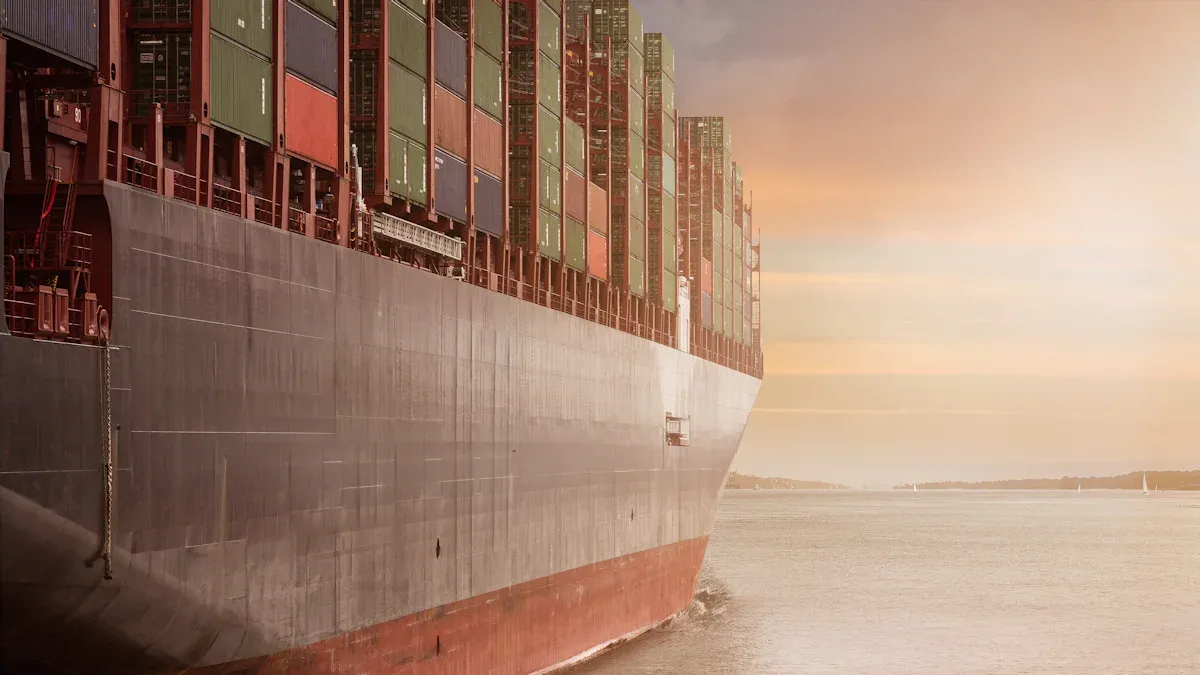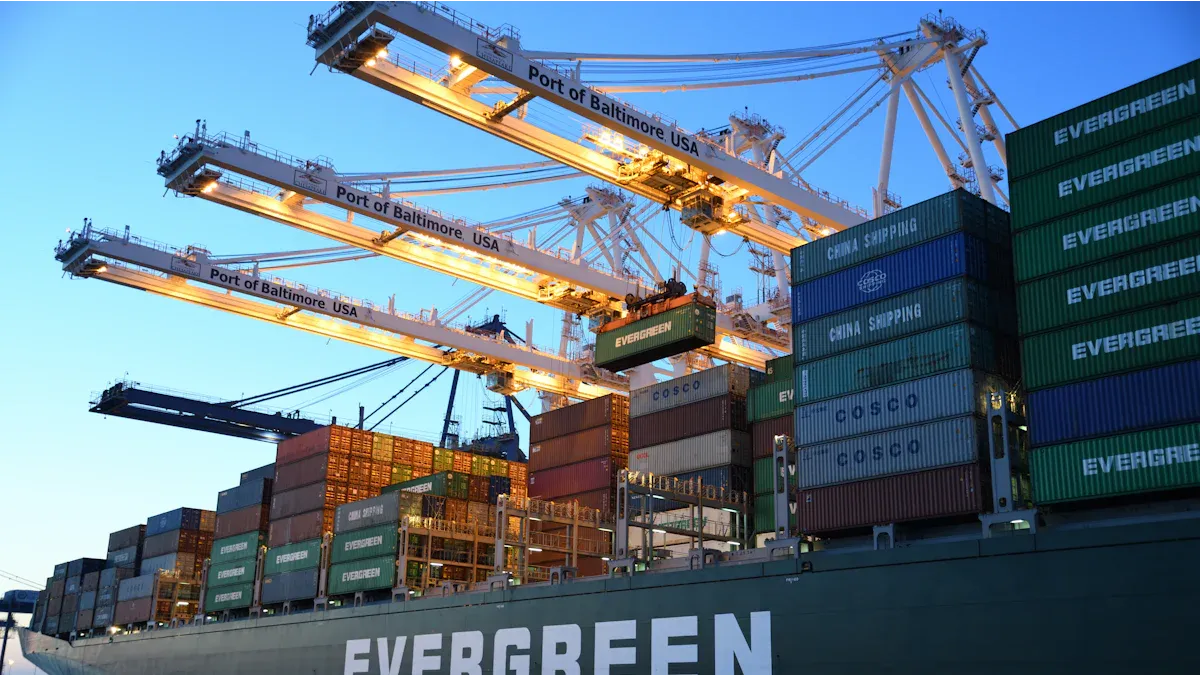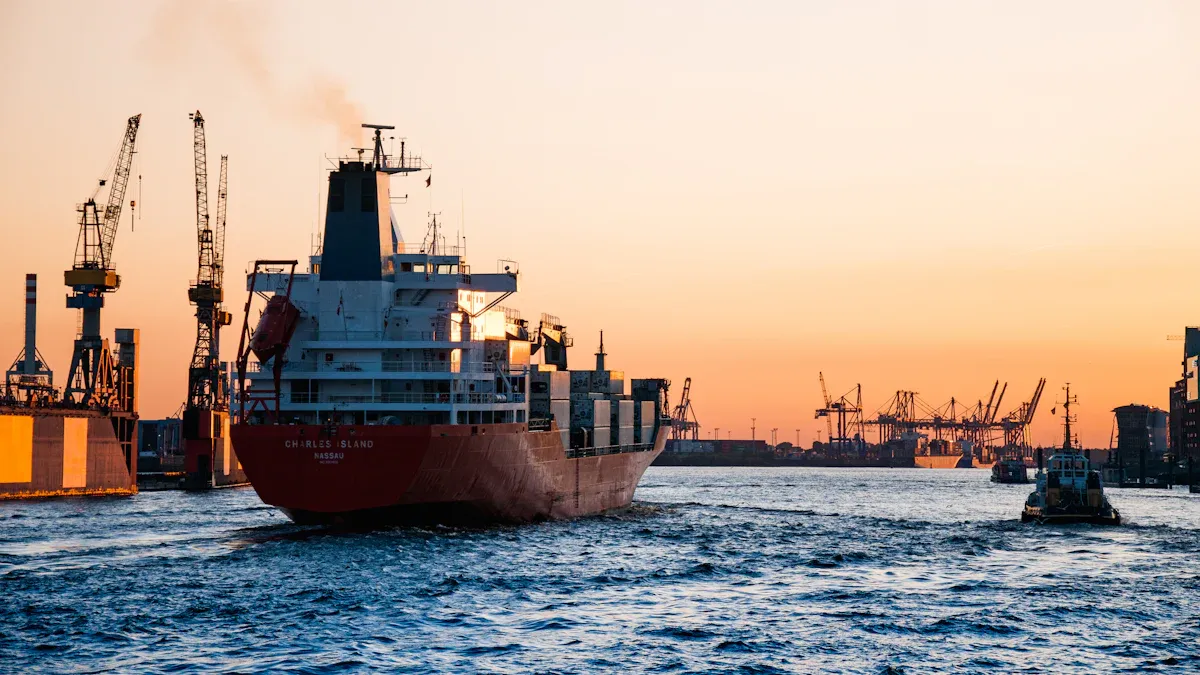How to Choose the Best Overseas Logistics Provider for Your Business in 2025

World trade relies heavily on overseas logistics solutions. These solutions facilitate the smooth movement of goods between countries, effectively meeting customer demands. Choosing the right international shipping company is crucial. The global shipping market, projected to reach $18.69 billion by 2026, highlights the increasing demand for enhanced worldwide services. The rapid growth in North America underscores the significance of intelligent shipping strategies.
Key Takeaways
Picking the right shipping company can make your business better. It helps things run smoothly and keeps customers happy.
Find companies that offer custom services to fit your needs.
A good worldwide network and experience are very important. Companies with big networks can deliver faster and handle border rules easily.
Use technology to track shipments live and stay informed. This improves delivery plans, saves money, and earns customer trust.
Understanding Overseas Logistics Solutions

What Are Overseas Logistics Solutions
Overseas logistics solutions help move goods between countries. They include services like shipping, storage, customs help, and stock management. These systems make sure products reach customers quickly and follow trade rules.
Here’s a table to explain some key terms:
Term | Definition/Example |
|---|---|
Logistics Outsourcing | A company works with a logistics provider for custom services. |
Third-party Logistics (3PL) | Hiring outside companies to handle tasks like shipping or storage. |
These services are vital for businesses wanting to grow globally. Online stores especially need fast logistics to keep customers happy.
Services Offered by an International Logistics Provider
International logistics providers offer many services to fit your needs. They handle shipping by air, sea, rail, or road. They also provide storage and delivery services. Customs help is key to clearing goods at borders.
Other services include tracking shipments, managing stock, and combining shipments. For instance, JUSDA’s JusLink uses smart tech to track supply chains. Using these services can simplify your work and help your business grow.
Why the Right Third-Party Logistics Provider Matters
Picking the right logistics provider can improve your business. With online shopping growing, outsourcing logistics helps you deliver orders faster and cheaper.
Research shows 71% of companies say logistics providers improve service. Also, 92% agree they make logistics more efficient. A good provider lets you focus on making products and planning strategies. They handle shipping, cut costs, and make customers happier.
Key Factors to Consider When Choosing a Provider
Global Network and Industry Expertise
A provider’s global network is key for smooth international shipping. It helps businesses expand into new markets and ensures operations run well. Providers with big networks can plan better routes, save time, and follow customs rules. This makes deliveries faster and keeps customers happy.
Tip: Pick a provider with strong industry knowledge. Their experience with global shipping and customs can save time and avoid problems.
Here’s a table showing why a global network matters:
Evidence Type | Description |
|---|---|
Global Network | A wide network of partners and agents ensures smooth shipping across borders. |
Faster Market Expansion | Good logistics systems help businesses grow quickly in new markets. |
Better Inventory Management | Smart logistics balance stock levels and reduce extra inventory. |
Range of Services and Customization Options
Different businesses need different logistics services. Providers offering air, sea, rail, and road transport can meet various needs. Custom solutions are also important. Providers that adjust their services to fit your business can make operations easier and more efficient.
For example, JUSDA’s JusLink platform uses smart tools for tracking shipments and managing supply chains. This helps businesses handle changes and grow smoothly.
Technology and Real-Time Tracking Capabilities
Modern technology makes logistics better. Real-time tracking lets you watch shipments, improve delivery routes, and share updates. This builds trust and helps teams work together.
Here’s why tracking matters:
It makes routes better using live data.
It saves money and cuts pollution with smarter deliveries.
It spots delays early and fixes problems fast.
One retail company used tracking and saw customer satisfaction rise by 30% in six months. This shows how tracking improves reliability and reputation.
Cost Transparency and Value for Money
Knowing logistics costs helps you plan your budget. Providers with clear pricing make it easier to understand expenses and avoid surprises. Look for companies that explain costs like storage, transport, labor, and equipment.
Category | Description |
|---|---|
Logistics costs are tracked under Supply Chain or Fulfillment departments. | |
Sub-categories | Costs include warehousing, transport, labor, and equipment, following accounting standards. |
Importance of Accuracy | Clear cost tracking helps businesses make smart decisions about inventory and spending. |
Note: Clear pricing helps teamwork and better cost control, giving you more value for your money.
Scalability and Adaptability for Business Growth
Your logistics provider should grow as your business grows. Scalability lets you handle more orders without lowering service quality. Flexible solutions, like cloud logistics, help you adjust to market changes quickly.
Here are examples:
Shopify handled 3.6 million sales per minute during Black Friday 2024.
GEODIS opened four new centers in six months, boosting home deliveries by 35%.
These examples show why picking a provider that supports growth is important.
Customer Service and Crisis Management
Good customer service is vital for reliable logistics. Providers with quick response systems solve problems fast and keep trust during tough times. Metrics like Average Speed of Answer (ASA) and Customer Effort Score (CES) show service quality.
Metric | Description |
|---|---|
Average Speed of Answer (ASA) | Measures how quickly calls are answered, showing responsiveness. |
Average Handle Time (AHT) | Tracks how long agents spend on calls, showing efficiency. |
Customer Effort Score (CES) | Shows how easy it is for customers to fix issues, with lower scores meaning better service. |
Service Level | Measures how many calls are answered quickly, aiming for 80% within 20 seconds. |
Tip: Strong customer service systems help manage expectations and protect your reputation during hard times.
Steps to Evaluate and Compare Providers
Researching Reviews and Industry Reputation
Start by checking reviews to see how providers perform. Websites like Trustpilot and Google Reviews show customer experiences. Look for patterns, like praise for fast deliveries or complaints about poor communication.
Notice how companies handle problems. A provider that fixes issues quickly and stays honest is likely dependable. Awards and certifications also show they are skilled and trustworthy.
Tip: Read reviews from businesses like yours. Their feedback shows if the provider fits your needs.
Requesting Proposals and Comparing Costs
Ask providers for detailed proposals to compare their services. A good proposal explains what they offer, their prices, and extra benefits. Compare these side by side to find the best match.
Focus on clear pricing. Choose providers who explain costs like transport, storage, and labor. This avoids hidden fees and helps you save money.
Proposal Element | Description |
|---|---|
Services Offered | Lists transport, storage, and extra services. |
Pricing Transparency | Breaks down costs to avoid surprises. |
Additional Benefits | Includes tools like tracking or special solutions. |
Note: Pick a provider that offers good quality at a fair price.
Conducting Interviews and Assessing Cultural Fit
Interviews help you see if a provider matches your business values. Ask questions about problem-solving or their focus on sustainability.
Cultural fit is important for teamwork and long-term success. Providers who share your values will work better with your team.
Evidence Type | Description |
|---|---|
Case Study | Shows how companies align strategies through interviews. |
Statistic | |
Insight | Questions about values help find the right match. |
Tip: Use interviews to see how flexible and responsive providers are. Flexible providers handle challenges better.
Evaluating Track Records and References
A provider’s history shows how reliable they are. Ask for references and check if their claims match real results. Positive feedback shows trust, while detailed reviews highlight strengths and weaknesses.
Look at metrics like delivery accuracy and customer satisfaction. These show if the provider can meet your needs.
Check Claims: See if their promises match their performance.
Quality Check: Learn if they are consistent and reliable.
Spot Risks: Find potential problems from past experiences.
Customer Relations: See how they respond to clients.
Save Money: Avoid costly mistakes by choosing wisely.
Compare Results: Use feedback to rank providers.
Build Trust: Positive reviews show they are dependable.
Tailored Feedback: Focus on what matters to your business.
Follow Rules: Ensure they meet legal requirements.
Long-Term Success: Pick a provider for lasting partnerships.
Note: Choose providers with a strong history of good results. Their experience will help your business grow.
Emerging Trends in Overseas Logistics for 2025

Sustainability and Green Logistics Initiatives
Sustainability is changing how global logistics works. Companies now use green methods to lower pollution and meet customer needs. Carbon-neutral shipping is becoming popular. Businesses achieve this by using biofuels and planning better routes. Electric trucks and energy-saving warehouses are also increasing. These changes show a move toward eco-friendly shipping.
The Green Logistics Market is growing fast. This is due to stricter pollution rules and new tools like air quality monitors. In the US, transportation causes 27% of greenhouse gases, the most of any sector. Supply chains cause 90% of environmental harm in packaged goods industries. These facts show why greener logistics is so important.
Tip: Pick providers focused on green logistics. Their eco-friendly efforts can boost your brand and save money over time.
Advanced Technology Integration in Freight Forwarding
Technology is improving freight forwarding. Automation replaces manual work, making tasks faster and more accurate. Real-time tracking shows live updates on shipments. This reduces worries and improves communication. These tools make global shipping more dependable and clear.
Tech also helps with green goals. Electric vehicles and carbon-neutral shipping show the industry's focus on cutting emissions. Using advanced tools can simplify your work and help meet eco-friendly targets.
Callout: Use tech-based services to stay ahead. Providers with automation and live tracking can deliver smarter and faster.
Geopolitical and Regulatory Considerations
Politics and rules affect global shipping. Political stability, corruption levels, and tax laws impact logistics. A risk chart helps businesses plan by ranking risks by importance and chance.
Rules differ by region, so providers must adapt quickly. Following export laws and customs rules ensures smooth shipping. Providers skilled in handling these challenges can save time and avoid problems.
Evidence Type | Description |
|---|---|
Geopolitical Risk Indicators | Political stability and corruption levels affecting logistics. |
Regulatory Compliance Data | Tax and export rules impacting global shipping. |
Risk Assessment Matrix | Ranks risks by importance and chance for better planning. |
Note: Work with providers who know how to handle political and rule-based challenges. Their skills can protect your business from issues.
Why JUSDA Is Your Ideal International Logistics Provider
JUSDA’s Global Network and Industry-Specific Expertise
JUSDA has a large global network for smooth shipping worldwide. It has over 155 service points and warehouses covering 2.5 million square meters. This helps businesses in industries like electronics, cars, and FMCG. With JUSDA, you can confidently grow into new markets.
JUSDA also has special knowledge for different industries. For example, it offers custom solutions for energy storage products that follow safety rules. By understanding industry needs, JUSDA helps improve supply chains and lowers risks.
Tip: Pick a provider with a big network and expert knowledge for better logistics.
How JUSDASR Enhances Cross-Border Logistics Efficiency
JUSDASR makes cross-border shipping easier for online sellers and factories. Its warehouses near U.S. ports and airports speed up deliveries. Dropshipping and partnerships with FedEx and UPS ensure packages arrive on time.
JUSDASR’s supply chain tools improve performance and customer happiness. They also help manage costs and make global trade smoother.
Evidence Type | Description |
|---|---|
Makes cross-border shipping faster and better. | |
Customer Satisfaction | Builds trust with on-time deliveries. |
Financial KPIs | Helps control costs and increase profits. |
Trade Facilitation | Makes international trade easier. |
Leveraging JusLink for Real-Time Supply Chain Visibility
JusLink uses smart tech to give live updates on your supply chain. It combines IoT, cloud tools, and big data to track shipments and stock. You can spot delays early, plan better routes, and make smarter choices.
Real-time tracking has clear benefits. A fruit company cut driver wait times with tracking tools. Another business followed rules and lowered risks using cloud systems. These examples show how JusLink improves logistics and builds customer trust.
Callout: Live tracking boosts efficiency and makes your business more reliable.

JUSDA Solutions
To provide you with professional solutions and quotations.
Picking the right logistics provider keeps your business running well. Matching their services to your needs makes work easier. It also helps keep customers happy. Providers with custom options and smart tools give you an edge. JUSDA is a reliable partner with experience and a global reach. They are ready to help your business grow.
See Also
Discover The Comprehensive Overview Of Global Logistics Firms
Exploring The Latest Developments In Sea Freight Logistics
Five Leading Logistics Programs To Watch In 2024
